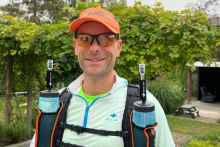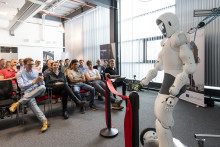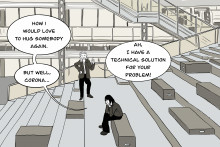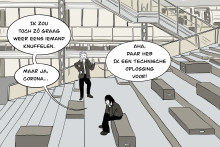Dresscher’s PhD work is a part of the ROSE project, which aims to develop a team of air, water and ground based robots that collaborate to acquire data about the dikes’ condition. That is, naturally, a task too big for a single PhD candidate, but Douwe Dresscher is definitely doing his part.
Easy idea, hard execution
‘Even one entire robot of this type is too much for one person. My focus has been on energy autonomy of a ground based robot. I have discovered that energy consumption and locomotion are one of the main problems leading to a low performance of the robot. It is because the robots use electrical motors that are inefficient. The obvious solution is to use less of them. That sounds easy, but it is difficult to execute’, Dresscher describes his work.
He plans to use only small electrical motors combined with an alternative way of motion. ‘I am now working on an alternative drive system of the robot. The robot might look the same on the outside, but it is different internally.’ Soon, Dresscher will test his setup to determine if the robot works efficiently enough. ‘If the results of my experiments are positive, the robot will need to be made smaller and lighter in order to be implemented in real dikes.’
Implementation of autonomous robots
The actual implementation will, however, already be some other researcher’s task. ‘After I got my Master’s degree here at the UT, I knew that academia is a beautiful place, where I wanted to work. It’s a sphere, where people work to increase and teach knowledge. I really liked that idea, but I underestimated the amount of writing that goes with it’, smiles Dresscher, who is ready to enter the private sector after he finishes his PhD studies. ‘I got to see a different side of academia, but I also got to investigate an interesting topic.’
Dresscher believes that the creation of autonomous robots, that will help to make life easier for many people, will be possible in the near future: ‘All the building blocks are there, so we "just" need to combine them and create a dike inspecting robot. Anyway, it will still take a while before we can deploy it and only check on it every few months.’ As said, it’s a job too big for one person.








